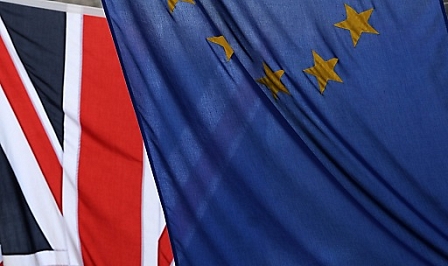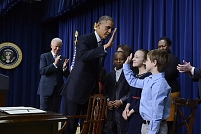Erstellt am: 17. 1. 2013 - 15:42 Uhr
Cameron's Euro-gamble
Subscribe to the Reality Check podcast and get the whole programme after the show.
Britain has always had a rather strained relationship with the rest of Europe. This, of course, goes back thousands of years - and once again, it's reaching breaking point.

EPA/Andy Rain
All in all, Britian has never quite considered itself "Europe proper". It is more like a sometimes benevolent, sometimes grumpy uncle, watching the game from the side-lines. He occasionally joins in, but only for a short time before retiring back to the benches and shouting advice, encouragement and criticism at the players.
It's a perception that is sometimes shared from Europe as well. It's not that long ago since an Austrian policeman asked for my residence papers. I said I didn't need any, as I am an EU citizen, and produced my British passport. He then told me Britain was not in the EU. I pointed out the text on the passport that clearly says Britain IS in the EU, and we had a laugh about it. I'm sure he was not alone in his belief. In fact, I think there were quite a few Britons who didn't believe Britain was in the EU - and a lot more who thought it shouldn't be.
So where did all this British Euro-scepticism come from? We could go right back to the Romans, but let's just go back to the Treaty of Rome in 1957, which created the European Economic Community. Britain refused to join.
A few years later, in 1963, Britain fancied a slice of the economic pie, and applied to join, but was turned down by a French veto. French President, Charles de Gaulle, was worried about American influence creeping in.
In 1973, The French veto was removed, and Britain became the 9th member of what was then the Common Market. Two years later, in a nationwide referendum, 67% of voters supported staying in the EU, despite a lively and vocal campaign to bring the country out.
However, Europhobia continued in Britain with all moves to align and centralise European government being bitterly fought in London. In 1990, moves by the President of the European Commission, Jaques Delors, to introduce Europe-wide labour regulations inspired the historic headline in The Sun, "Up Yours Delors".
Then came Maastricht, in 1992 - the treaty that established the European Union. Even then, the UK was cautious and negotiated an opt-out which meant it did not have to join the Euro and did not have to adopt the same financial regulations as the rest.
This ambivalence sometimes veering towards antipathy regarding Europe is something that is resonating with Prime Minister, David Cameron. Tomorrow, he makes a much anticipated speech on the future of the relationship between the UK and the EU, which is expected to focus on plans to "loosen the ties" with Europe. It looks as though he will call for a referendum which will offer the choice between a looser relationship and leaving altogether - though it's unclear how this will go down in Brussels.
Our London correspondent, Olly Barratt, previews Cameron's speech, and how it might end up back-firing.
Dieses Element ist nicht mehr verfügbar
Islamic extremists take hostages in Algeria
Islamist militants have taken dozens of foreign workers hostage as a gas facility in Algeria, demanding an end to the French intervention in Mali. Professor Jeremy Keenan from the School of Oriental and African Studies at the University of London explains the complex connections between the Algerian government and the Islamic extremists.
Dieses Element ist nicht mehr verfügbar
Obama's gun proposals

EPA/Michael Reynolds
US President Obama has signed into law 23 executive actions on gun laws, accompanied by children who had written to him appealing to him to make urgent changes to the law.
Priscilla Huff reports on the new laws and public reaction to them.
Dieses Element ist nicht mehr verfügbar
Salzburg financial scandal
Eric Frey gives his analysis of the latest revelations surrounding the Salzburg scandal.
Dieses Element ist nicht mehr verfügbar
Idle No More
The Canadian indigenous people's protest movement that has brought much of Canada to a standstill.
Dieses Element ist nicht mehr verfügbar
FM4 Reality Check
Monday to Friday from 12.00 to 14.00, and after the show via Podcast or fm4.orf.at/realitycheck.


